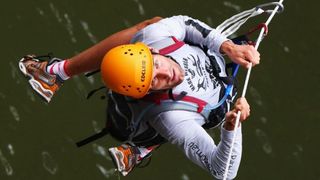Train like Mark Webber
The F1 star hosts and competes in his own multi-discipline endurance race and here's how he trains for it.

As a man who hurtles around a track at 300km/h for a living, it's fair to say that Mark Webber is adventurous. When he isn't in the fast lane with world championship-winning F1 team Red Bull Racing, the 35-year-old Aussie feeds his adrenaline habit with outdoor sports and endurance racing. This year sees the return of his charity endurance event, the Swisse Mark Webber Tasmania Challenge, in which teams will run, mountain bike, kayak and abseil around the antipodean island.
Covering up to 90km each day, the five-day challenge is no walk in the park and requires Ironman-style preparation. In addition to the year-round training that allows Webber to cope with the extreme physical demands of a formula one season, his physiologist Simon Sostaric has devised a regime to help him triumph in the great outdoors.
If you are an outdoor pursuits lover, or training for a multidiscipline event like an Ironman or a triathlon, read on to work out like the fastest man in Australia.
Endurance fitness
‘A good base of fitness can be developed with a commitment of around 45-75 minutes a day during the working week – including a few interval sessions – and two or three hours on weekends,’ says Sostaric. He also recommends a few half-days of low-moderate consecutive intensity activities. ‘This will help you prepare for simulating “time on the go” and for managing the organisational skills expected in an endurance race.’
Running
Running can be done virtually anywhere, but for an off-road event it's best to head off-road or through parkland that provides changing terrain. ‘Running will impose the greatest musculo-skeletal load on your body,’ says Sostaric. ‘So be careful with the rate of increasing volume over time – this should not be more than an additional 10% per week.’
Mountain biking
If you don't have access to a mountain bike, start off by cycling in the gym. Steady-state exercise at 65-70% effort is sufficient while the initial phase of fitness is developed. ‘Once you get your hands on a mountain bike, focus on developing technical skills on single tracks and up and down hills,’ says Sostaric. ‘Start with short-duration expeditions where a lack of fitness does not preclude you from learning and practising technical skills.’
Kayaking
Obviously not everybody has a kayak to hand, so start with the gym rowing machine. ‘While rowing is a different action to kayaking, there are some similar muscle groups activated, including the upper back, shoulders, arms and abdominals for stability," says Sostaric. If you're going to be kayaking, though, you'll eventually need to hire one and take it on flat water to learn skills and techniques required to improve balance, co-ordination, and stroke efficiency – check out the British Canoe Union for your local kayak centre. ‘When you become proficient on flat water, it’s time to venture into open water, which requires another level of strength, confidence and foresight into reading water conditions,’ says Sostaric.
Strength work
A significant amount of this adventure training is already ‘leg dominant’, so prioritise strength work in the upper body and trunk. Examples, which should be done twice per week, include but are not limited to:
Bench press or dumb-bell press (2-3 sets of 12 reps)
Lateral pull-down or seated row (2-3 sets of 12 reps)
Lateral and front dumb-bell raise (2-3 sets of 8 reps)
Squats or leg press (2-3 sets of 12 reps)
Leg raise (2-3 sets of 10 reps)
Core exercise (eg jackknife) (2-3 sets of 10-15 reps)
Back extension (2-3 sets of 10 reps)
Plank and side plank (2-3 sets of 20sec)
Rest and recovery
‘The biggest mistake debutant endurance athletes make during the lead-in to competition is getting the training/recovery balance wrong,’ says Sostaric. Enthusiastic athletes have a tendency to overtrain, which can substantially increase the risk of developing soft-tissue injuries and illnesses. Remember to include at least one rest day per week and to seek assistance from an experienced fitness coach if things aren't going to plan.
The Swisse Mark Webber Tasmania Challenge raises funds for the Mark Webber Foundation.
Visit the Challenge's Facebook page here.
For more expert exercise advice read Men's Fitness magazine. Subscribe now and get five issues for £5.
Get the Coach Newsletter
Sign up for workout ideas, training advice, reviews of the latest gear and more.
